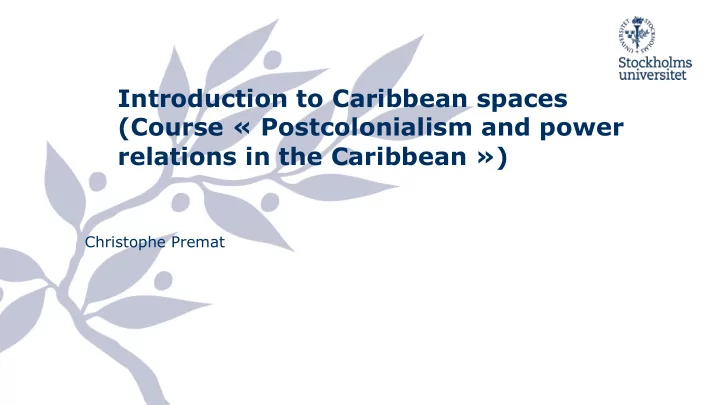

Introduction to Caribbean spaces (Course « Postcolonialism and power relations in the Caribbean ») Christophe Premat
Brainstorming ● List the representations that you have when you hear about the Caribbean spaces ● What are your expectations of the course?
Perceptions of the Caribbean space ● ”The Caribbean, in my vision, is a place of constant new birth, consistent destruction and regeneration, tearing down and making over, an ongoing site of transformation” (Boyce, 2013: 33). ● #Task 1 Comment the quote with the help of the course expectations. How do you interprete it?
What is the Caribbean space? ● Who addresses the question? (The name) ● Why will we use ”postcolonial theories” to talk about the Caribbean space? ● What is the importance of the Caribbean space in global history? ● Is there a form of Caribbean civilization?
Environmental issues ● Tropical climates ● Types of mangroves (biodiversity of the Caribbean). Cf Maryse Condé, Crossing the mangrove ● Hurricanes and tornados (Irma…) ● Earthquakes (Haiti, 2010)
Climate change ● The 2015 Caribbean drought especially in Puerto Rico. ● Noticeable droughts (1974-1977 / 1997-98 / 2009-10 and 2013- 16) ● https://journals.ametsoc.org/jcli/article/30/19/7801/342696/Insig hts-from-a-New-High-Resolution-Drought-Atlas
The political complexity of the Caribbean islands 14 sovereign States ● Around 30 territories linked to other countries, 17 dependencies ● Territorial autonomy. Space in transition ● Paradox: geographical centrality of these islands and political fragmentation of these spaces ● Presence of colonial languages (English, French, Spanish, Dutch…) ● Dissolution of the Netherlands Antilles on 10 October 2010 ● Many recent referenda to determine the status of some Caribbean territories ●
A diversity of small islands split into different configurations Area of 250.000 km2 ● Around 42 000 000 inhabitants ● The UK has 5 dependencies and the Netherlands has 6. ● France has 2 dependencies + 2 autonomous territories (Saint-Martin). ● Some territories have been disputed by colonial powers (the case of ● Saint-Lucia which has been dominated by the UK and France – 16 times)
Scandinavia and the Caribbean ● # Task 2 What are the historical relations between Scandinavia and the Caribbean?
The enslavement ● The Caribbean: a zone of enslavement in the first processes of globalization ● Link between capitalism and slavery (Martin, 2016: 188) ● Emancipation (Maroon revolts). Resistance against imperialistic powers. Autonomous Maroon communities. Inspiration for the abolitionnist movement. ● The postcolonial thinking helps us to think around the dialectics enslavement / emancipation.
The tragedy of slavery ● https://commons.wikimedia.org/wiki/File:Slaveshipposter.jpg ● https://www.wikigallery.org/wiki/painting_157893/John-Gabriel- Stedman/A-Female-Negro-Slave-with-a-Weight-Chained-to-her- Ankle%2C-engraved-by-Francesco-Bartolozzi-1725-8-1815-1795 (Martin, 2016: 75) ● https://en.wikipedia.org/wiki/Olaudah_Equiano#/media/File:Danie l_Orme,_W._Denton_- _Olaudah_Equiano_(Gustavus_Vassa),_1789.png
The tragedy of slavery ● Testimonies of Olaudah Equiano (Martin, 2016: 64) ● ”Of the major regions involved in the slave trade to the Caribbean, namely Europe, North America, Africa and the Greater Caribbean, Africa was the only one absent from the more lucrative aspects of the business” (Martin, 2016: 70). ● https://www.repository.cam.ac.uk/bitstream/handle/1810/240143 /3140.jpg?sequence=2&isAllowed=y
A cultural homogeneity due to history ● Slavery (common point): these spaces connected three continents in the trauma of slavery. ● Cultural heritage of this first form of globalization ● Racialization of the spaces during the experience of slavery (Cf. Frantz Fanon with the necessity of decolonizing the spaces). ● Notion of cultural hibrydity / métissage (Édouard Glissant) / Transculturation (Ortiz) (Elfriede, 2007)
Example of the Gwo-Ka in Guadeloupe islands ● https://www.guadeloupe-islands.com/gwo-ka/ ● Roots in the seventeenth century (transatlantic slave) ● Rhythm (different types of Gwo-Ka) ● https://www.youtube.com/watch?v=9hp1G6lzxss
Postcolonial thinking ● #Task 3 How do you define postcolonialism? Why is it appropriate to apply it on Caribbean spaces?
A geostrategic crossroads ● # Task 4 What are/were the big powers involved in the Caribbean space? ● List all these powers and explain why/how they were involved. What were the consequences for the Caribbean space according to you?
A geostrategic crossroads ● Access to Central America / South America / United States ● Today, Caricom (Caribbean community that also includes territories of South America with Guiana). Cf http://www.caricom.org ● Modest regional organization that does not include countries such as Cuba or the Dominican Republic ● Important crisis during the Cold War with the crisis of Cuba in 1962 (missiles…).
Is reparation possible? ● Question of reparation. The Caribbean as a zone of domination during the transshipment. The Caricom asked for reparations. https://caricom.org/reparations-for-native-genocide-and-slavery/
Redemption song (Bob Marley) – 1980 - ● ”Old pirates, yes, they rob I Sold I to the merchant ships Minutes after they took I From the bottomless pit” ● https://www.youtube.com/watch?v=kOFu6b3w6c0&list=RDkOFu6 b3w6c0&start_radio=1&t=0
Redemption song (Bob Marley) – 1980 - ● ”Emancipate yourselves from mental slavery None but ourselves can free our minds Oh, have no fear for atomic energy 'Cause none of them can stop the time”
References Boyce, Carole Davies. 2013. Caribbean Spaces : Escapes from Twilight Zones. University of Illinois ● Press. Elfriede, H.. 2007. Communicating with Transculturation . Journal de la Société des Océanistes ● [Online], 125 | Online since 01 December 2010, https://journals.openedition.org/jso/980 Herrera, D., and T. Ault, 2017: Insights from a New High-Resolution Drought Atlas for the Caribbean ● Spanning 1950–2016. J. Climate , 30 , 7801–7825, https://doi.org/10.1175/JCLI-D-16-0838.1. Martin, Toni. 2016. Caribbean History. From Pre-Colonial Origins to the Present. London : Routledge. ●
Recommend
More recommend